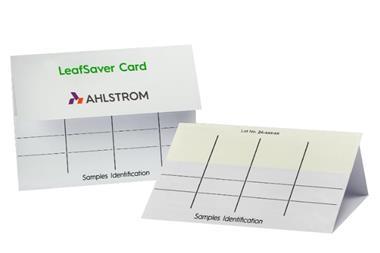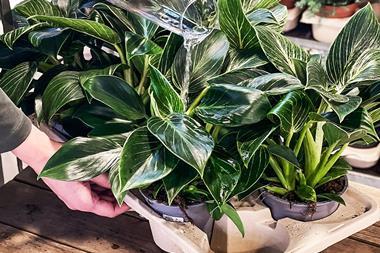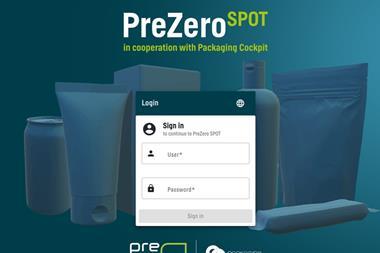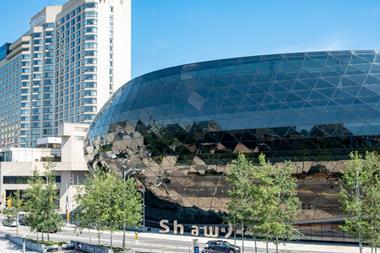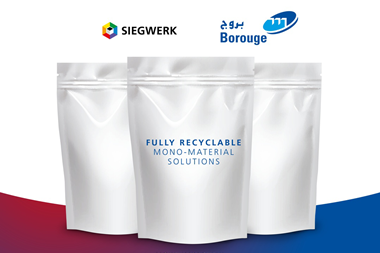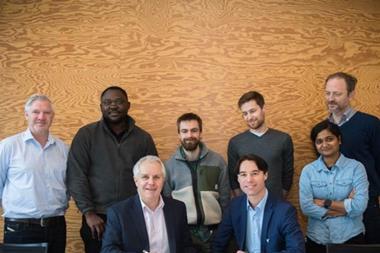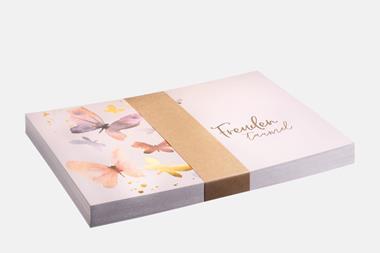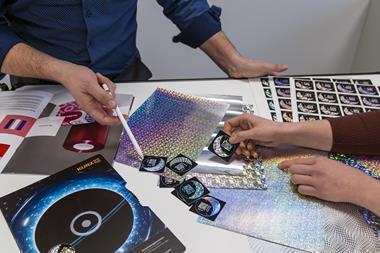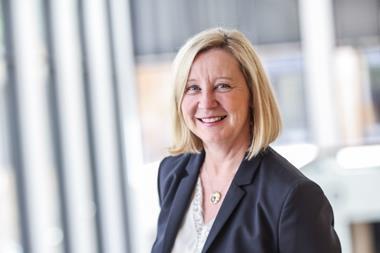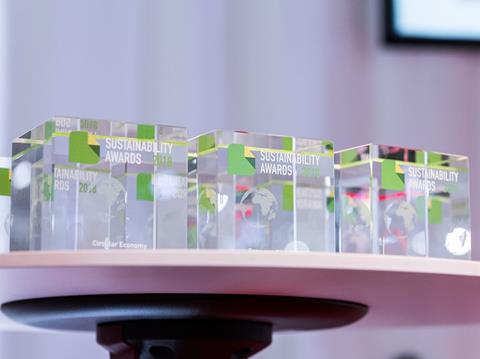
The winners of the world’s most prestigious competition for sustainable packaging innovation have been announced in Gothenburg, Sweden.
Uflex won both the overall Sustainability Awards 2018 trophy and in the ‘Resource Efficiency’ category, while Coca-Cola, Amcor, the VTT Technical Research Centre of Finland, James Cropper and Mayr-Melnhof Karton also scooped awards. The Awards ceremony took place on 23 October on a buzzing Superbrand stage at Scanpack, hosted by Packaging Europe with the support of sponsors Avery Dennison, Mondi, Rockwell Automation and Borealis.
The winner of the coveted overall ‘Best Sustainable Packaging Innovation’ as well as winner of the ‘Resource Efficiency’ category was Uflex Limited for its biodegradable, waterless flower packaging solution.
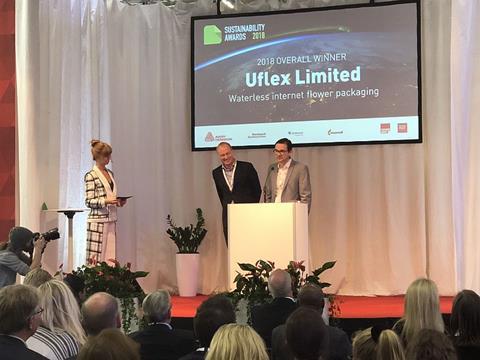
The innovation creates significant energy reductions in the supply chain while prolonging the freshness of flowers for 20 days without water. The company has engineered a special patented proprietary polymeric film for packaging fresh fruits, vegetables and flowers. The solution is based on a special Active Modified Atmospheric Packaging Technology (AMAP).
In the ‘Best Practice’ category, Coca-Cola Western Europe emerged victorious for its sustainability action plan ‘This is Forward Circular Economy’. The plan focuses on three leadership priorities: Drinks, Society and Packaging, and outlines a detailed sustainability plan for packaging to be achieved by 2025.
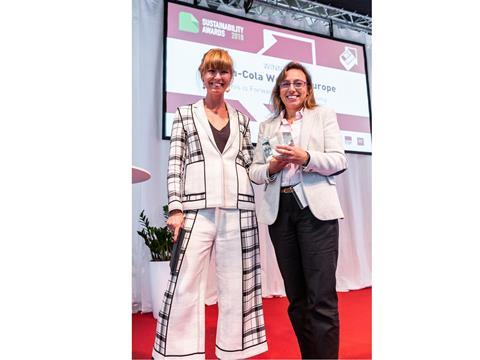
The winner in the ‘Machinery’ category was Amcor Rigid Plastics and The Liquiform Group for their groundbreaking liquid forming technology. The LiquiForm® technology uses consumable liquid instead of compressed air to simultaneously form and fill the container, which means that the liquid product in essence forms its own rigid plastic container.
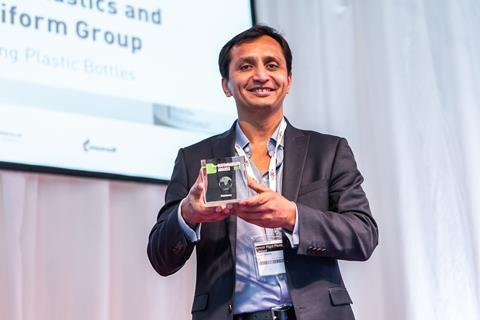
Moving on to the ‘Bio-Based Packaging’ category, VTT Technical Research Centre of Finland’s cellulose-based packaging substrate was crowned the winner, a compostable three-layered material solution that looks and performs like plastic but is made from nature’s own raw material – cellulose.
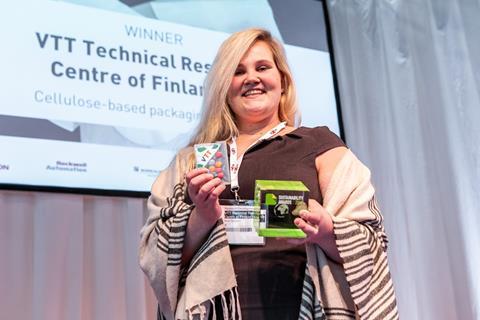
In the ‘Driving the Circular Economy’ category, James Cropper’s CupCycling™ solution impressed the judges the most. James Cropper has developed the technology to recycle disposable paper cups on a commercial scale for the first time, addressing the issue of only one in 400 paper coffee cups currently being disposed correctly.
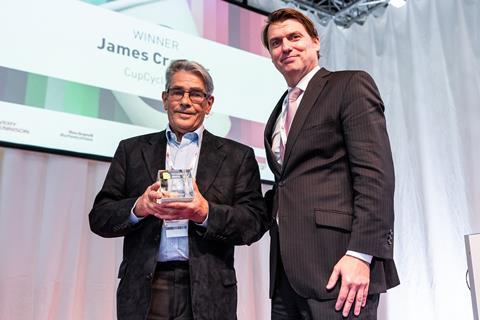
Finally, the winner in the ‘Recyclable Packaging’ category was Mayr-Melnhof Karton GmbH’s FOODBOARD™ virgin fibre. This next-generation virgin fibre cartonboard with an innovative barrier concept as the core component, ensures highest product safety.
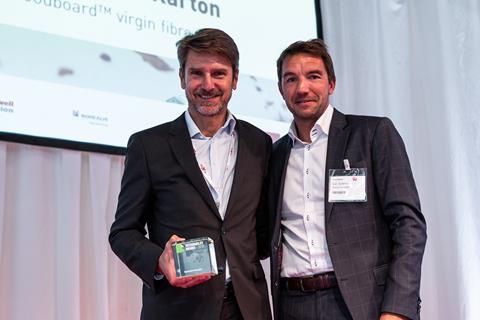
The most prestigious competition for sustainable packaging
The 2018 edition of the Sustainability Awards received over 100 innovative submissions, which were graded by a seventeen-strong, independent, expert judging panel representing the breadth of the European packaging value chain.
“The Sustainability Awards have grown steadily in profile since we launched the initiative but in 2018 we have been taken aback by the engagement,” commented Tim Sykes, Packaging Europe’s head of content. “I think this reflects the increased urgency with which consumers and regulators has demanded solutions to environmental problems associated with packaging in 2018. But it also reflects the serious thought and investment the whole packaging value chain has been putting into sustainability. In my opinion, the submissions to this year’s Sustainability Awards, as a snapshot of sustainable innovation, demonstrate greater depth and more substantive progress across the industry than ever before. Moreover, most of these innovations are the culmination of years of R&D or planning. We’re proud not only of our winners, but of the 24 finalists and the achievements of the packaging world in general as reflected in this competition.”
The Sustainability Awards combined this year with the Sustainable Packaging Summit to create the green packaging event of the year. Compered by TV presenter Frida Zetterström and hosted by Packaging Europe, the ceremony drew large crowds at Scanpack’s Superbrand stage.
Resource Efficiency
This category honoured innovations in packaging that do more with less, such as downgauging material or reducing the carbon footprint without increasing the environmental impact of the packaged products.
The winner Uflex Limited’s Waterless Internet Flower Packaging is based on Active Modified Atmospheric Packaging Technology (AMAP). Uflex Limited has engineered a special proprietary patented polymeric film for offering packaging solution for fresh fruits, vegetables and flowers. A Fast Respiration Meter is used for ascertaining the respiration rate of flowers and associated software thereafter calculates the required film permeability.
A special laser system uses this information to adapt the permeability of the film offered by Uflex through micro perforations.
This special proprietary polymeric substrate is the first biodegradable (by composting) film that maintains the hydration of flowers during transpiration (evaporation causing loss of moisture during respiration) thus creating a closed loop system. Flowers are put to slow respiration mode by reducing the oxygen availability preventing excess oxidation and dehydration. The film keeps the flowers breathing in hydrated oxygen and release excess humidity keeping them touch dry.
The flowers thus can go without water for 20 days as the humidity is fed back in to the flower when it continues to breathe in the modified atmosphere and further seven days in vase.
The other finalists in the ‘Resource Efficiency’ category included Stora Enso’s EcoFishBox, Billerud Korsnä’s Disappearing Cement Sack and Nanopack’s Horizon 2020 funded project for antimicrobial packaging.
Best Practice
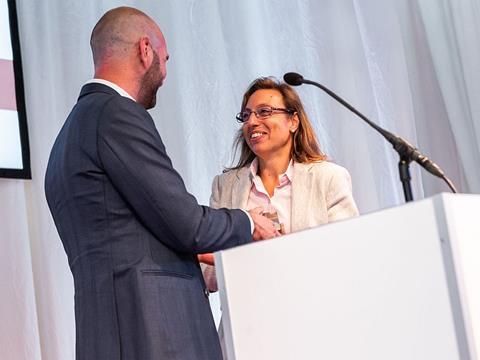
Many retailers and brand owners have been working hard to minimise the environmental impact of packaging and its supply chain. Apart from winner Coca-Cola Western Europe, finalists included Marks & Spencer’s Plan A, Iceland Foods for being the first retailer globally to go plastic free, and Garçon Wines’ recycled PET flat profile wine bottle.
In October 2017, The Coca-Cola Company in Western Europe and Coca-Cola European Partners launched a joint Sustainability Action Plan, This is Forward. Coca-Cola is taking action on sustainability by using its business and its brands to build a better future, for people and the planet.
Sustainability is at the heart of Coca-Cola business and a tremendous progress has been made but more can be done, especially in Packaging. As a leader in the industry, it has both the strength to act and the responsibility to set new standards for sustainability packaging under the Circular Economy approach.
This is Forward is focused on three leadership priorities: Drinks, Packaging and Society. For Packaging this is the Plan by 2025:
• Coca-Cola will make sure that 100% of their packaging is recyclable or reusable
• Coca-Cola will work with local and national partners to collect 100% of their packaging in Western Europe
• Coca-Cola will make sure at least 50% of the material used for PET bottles comes from recycled plastic
• Coca-Cola will use the reach of their brands to inspire everyone to recycle
• Coca-Cola will lead the way in pioneering sustainable packaging including renewable and smart ways to reduce packaging waste.
Bio-based Packaging
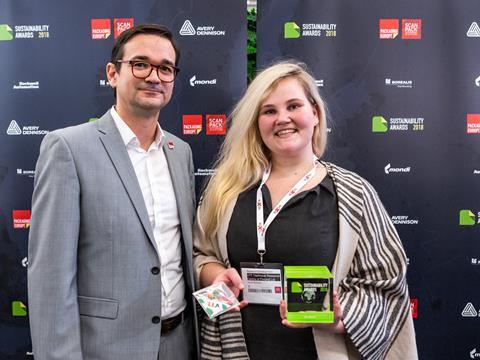
VTT Technical Research Centre of Finland Ltd has created a compostable three-layered material solution that looks and performs like plastic, but does not pollute the environment and oceans like regular plastic as it is made from nature’s very own raw material - cellulose. The compostable multilayer material is ideal for packaging dry food products like cereal and nuts, and flexible packaging air-sensitive products like chocolate, biscuits, thin cuts of meat or cheese, and potentially some liquids and moist food. It is ideal because of the material’s good barrier properties against gases, grease, mineral oils and moisture, which are essential properties for food packages.
The multi-layer packaging solution is built from two different cellulose-based transparent films that have complementary barrier properties and that essentially make the solution a monomaterial. The solution is processable with existing film and roll-to-roll manufacturing machines and processes. The films are processed in a way that does not introduce any unwanted or toxic chemicals.
VTT´s bio-based solution is built upon decades of research, experience and know-how on lignocellulosic (biomass) raw materials. These materials are very suitable for packaging and are already widely used in cardboard. As there are no well-functioning bio-based materials with good barrier properties available in the food packaging market, VTT started to investigate the potential of cellulose for this purpose.
The other finalists in this category were Agripap submitted by Rapid Action Packaging Ltd, Signature Pack by SIG Combibloc and sustainable feedstock for bio-based LDPE production by Dow Europe GmbH.
Driving the Circular Economy
The use and disposal of take-out coffee cups is a deeply concerning issue within society, with only a fraction of cups – one in 400 – being disposed of correctly. Consumers’ love of takeaway coffee shows no signs of diminishing, so a solution that reduces its environmental impact is high on the agenda for both the government and industry.
With CupCycling™, James Cropper has developed the technology to recycle disposable paper cups on a commercial scale for the first time, and has played an integral role in establishing demand for paper produced from used cups. By partnering with waste management companies, coffee chains and restaurants, James Cropper has created a suitable supply chain to enable cup waste to be transformed into beautiful papers.
High street restaurants and retailers, such as Costa, McDonald’s, and Selfridges, have installed cup collection stations to allow for correct disposal. There are now more than 4000 dedicated cup recycling stations nationwide. The used cups are collected by waste management partners for processing, before being delivered to James Cropper’s plant.
In a standout example of closed-loop recycling, James Cropper is rescuing Selfridges’ used cups from landfill and turning them into the yellow paper used to make the retailer’s iconic shopping bags. The bags can then be recycled with household paper waste, giving them a new lease of life for years to come.
CupCycling™ is a working example of the circular economy in action and how collaboration between businesses can lead to successful outcomes for both industry and the environment.
The other finalists included Coca-Cola Freestyle with re-usable intelligent bottles, SkyCell AG’s recycled temperature control container and Henkel’s Pattex Made at Home universal glue.
Machinery
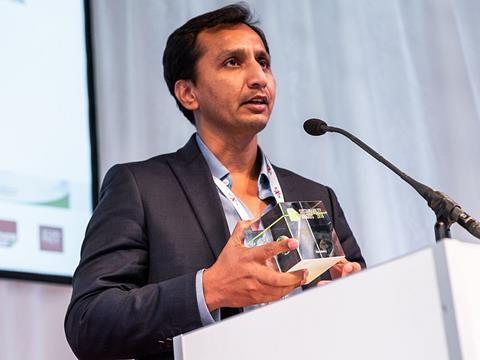
The finalists in this category were Ardagh Group’s sustainable hybrid battery storage, Sidel’s Aseptic Combi Predis ™ and DS Smitih Packaging Systems’ Made2Fit.
A disruptive technology is revolutionising the way packaging is being formed (and filled) for winner Amcor’s customers.
Known as LiquiForm®, this breakthrough technology uses consumable liquid instead of compressed air to simultaneously form and fill the container. In essence, the liquid product forms its own rigid plastic container through this innovative process.
This liquid-forming technology combines the bottle manufacturing and filling process into one step resulting in the removal of blow-moulding equipment and high-pressure air systems. Costs associated with equipment and space as well as handling, transportation, and storage of empty bottles are eliminated with LiquiForm®.
Recyclable Packaging
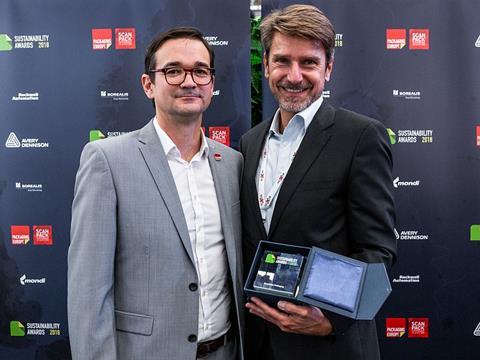
The protection of consumer health is the top priority for the food packaging supply chain. Discussions about mineral oils in food started in 2010. It therefore became an urgent challenge to find the cause of the mineral oil issue and to identify possible solutions.
With FOODBOARD™ virgin fibre, Mayr-Melnhof Karton has developed the next generation of cartonboard, which ensures the highest product safety: a virgin fibre cartonboard with an innovative barrier concept as the core component. FOODBOARD™ virgin fibre shields packed food against the migration of defined unintended substances such as mineral oils, phthalates and bisphenol A. The barrier provides comprehensive protection against penetration from printing inks and the environment, which can infiltrate packed food during transportation, storage and at the point of sale. Accordingly, FOODBOARD™ virgin fibre reliably protects against cross-contamination and means transparency throughout the supply chain.
Also in the final of this category were the X-Enviropouch by RPC bip protec, garment hanger recycling submitted by Braiform and WestRock’s Enshield Natural Kraft.
About the Sustainability Awards
The Sustainability Awards were founded and are organised by Packaging Europe with the aim of encouraging serious consideration of the requirements of complex environmental challenges, stimulating cross-fertilisation of ideas and promoting the best sustainable innovation. The WPO WorldStar-recognised competition has designed its categories and judging criteria to encourage a holistic view of sustainability. Its independent jury consists of experts representing the whole of the European packaging value chain in order to ensure judging is neutral, informed and balanced.

